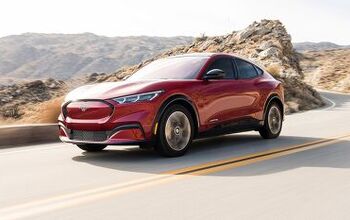Editorial: Redlining the Domestics
Loans and leases are getting hard to come by for anyone interested in a car or truck from GM, Chrysler or Ford. Banks now routinely put out lists with “red lines” through makes and models they no longer want to finance. Those products are increasingly domestic in origin. Redlined vehicles are harder to sell, forcing down values, rendering loans even more unattractive, making those cars and trucks even harder to sell, forcing down… you can see where this is going. Major lenders in the US are not waiting for The Big 2.8 to file for bankruptcy. They’re treating them like it’s a done deal.
To be fair, the money supply has tightened for everyone– whether you’re buying a Maytag or a Mitsubishi. Credit scores of 750 used to mean no problem, your car will be ready in a hour. That’s no longer the case. Banks have become mice at a falconry tournament, and it’s not hard to see why. They never really knew what their mortgage tranches were worth, and that bit them good. They thought they knew what SUVs were worth. Ouch again. Twice bitten is what? Four times shy?
SUVs and trucks first caused banks to uncap their red pens way back in the beginning of 2008, as gas prices began deflating values. By July, independent lenders like NBT Bank shut off leases for a litany of vehicles, citing gas prices as the raison du rouge. Their list included the still decent selling Porsche Cayenne and went on: No Ford trucks or SUVS, Chevrolet SUVs or Toyota SUVs. Then they started to broaden their negative horizons. No Chryslers, Jeeps, Hummers, GMCs, or Cadillacs. A little lending war had begun with Detroit. While this seemed extreme at the time, other money men followed suit, though not always with the same card.
Bank of America, for instance, does not say no. It’s more like not so much. They cut back on the amount of money they will front for certain vehicles. For example, last year you could finance 120 percent of the cost of your Suburban. This year, 110 percent. While this doesn’t seem too draconian, it’s yet another way of making some products harder to buy than others. Again, those hard-to-buy cars and trucks are turning out to be domestics.
Other lenders, like U.S. Bank, take yet a different approach. On November 1, they hiked their rates on Chrysler, Dodge and Jeep products, across the board. Unsure of what those products might be worth six months, let alone 48 months, from now, they’ve gotten skittish. They now rate Chrysler iron high-risk and price their loans accordingly.
The net result of turmoil in Detroit, then, is more turmoil. Timorous lending has been across the board, but that affects domestic more than foreign marques. Reason one: as has been reported here frequently, a lot of the car-oriented money men (e.g. GMAC) had notoriously louche lending standards. If a dealer had someone with shaky credit, that customer was pointed towards more Cobalts than Civics.
That’s over. The playing field has been leveled. Whether or not a lender is playing favorites, there is no more easy money. An advantage that was Detroit’s is lost.
Reason two: money for trucks and SUVs constricted first and most severely. GM, Chrysler and Ford were (and are, relatively speaking) more dependent on these products than their competitors, both in terms of market share and return on investment. So Toyota loses, but The Big 2.8 lose bigger.
Reason three: new vehicle buyers– and there are still millions of them– are choosing a foreign car over a domestic because the transplants are “saved by zero.” Now is the time nul points financing can really move the metal. And now is the time the domestics can’t offer it. Here, Detroit doesn’t just lose, one of the competitors gains. They get to watch market share shift.
The biggest hit to Detroit is in the area of confidence. Banks are competitive. They don’t all get together every couple of months and decide to simultaneously screw a couple of major US corporations. They are each arriving at the same conclusion separately. GM, Ford and Chrysler products are difficult to value. The only safe thing to do: cover the bet. Even better, stay away completely.
You can hardly blame the average consumer for taking the same stance. Mainstream cars and trucks are mostly fungible. If you can’t get bought on a Malibu, step this way. Hows about a Camry/Ultima/6/Accord/Galant/Sonata/I’m probably-forgetting-a-few? For most people, the differences just aren’t that noticeable when compared to whether or not the company’s around this time next year. As a selling point, that probably ranks up there with the AUX jack, number of cup holders and ideas about patriotism.
So, if Wagoner, Nardelli and Mullally are worried about perception, they can now relax. The stench of bankruptcy has already set in, and set in good.
More by Michael Martineck
Latest Car Reviews
Read moreLatest Product Reviews
Read moreRecent Comments
- Kjhkjlhkjhkljh kljhjkhjklhkjh Elon hates bad press (hence TWITTER circus) So the press jumping up and down screaming ''musk fails cheap EV'' is likely ego-driving this response as per normal ..not to side with tesla or musk but canceling the 25k EV was a good move, selling a EV for barely above cost is a terrible idea in a market where it seems EV saturation is hitting peak
- 1995 SC Wife has a new Ridgeline and it came with 2 years so I don't have to think about it for a while.My FIAT needed a battery (the 12V...not the drive battery), a replacement steering column cover and I had to buy a Tesla Charging adapter to use the destination charger at one of the places I frequent. Also had to replace the charge cable because I am an idiot and ran the stock one over and destroyed the connector. Around 600 bucks all in there but 250 is because of the cable.The Thunderbird has needed much the past year. ABS Pump - 300. Master Cylinder 100. Tool to bleed ABS 350 (Welcome to pre OBD2 electronics), Amp for Stereo -250, Motor mounts 150, Injectors 300, Airbag Module - 15 at the u pull it, Belts and hoses, 100 - Plugs and wires 100, Trans fluid, filter and replacement pan, 150, ignition lock cylinder and rekey - 125, Cassette Player mechanism - 15 bucks at the U Pull it, and a ton of time to do things like replace the grease in the power seat motots (it was hard and the seats wouldn't move when cold), Rear pinion seal - 15 buckjs, Fix a million broken tabs in the dash surround, recap the ride control module and all. My wife would say more, but my Math has me around 2 grand. Still needs an exhaust manifold gasket and the drivers side window acts up from time to time. I do it all but if I were paying someone that would be rough. It's 30 this year though so I roll with it. You'll have times like these running old junk.
- 3-On-The-Tree Besides for the sake of emissions I don’t understand why the OEM’s went with small displacement twin turbo engines in heavy trucks. Like you guys stated above there really isn’t a MPG advantage. Plus that engine is under stress pulling that truck around then you hit it with turbos, more rpm’s , air, fuel, heat. My F-150 Ecoboost 3.5 went through one turbo replacement and the other was leaking. l’ll stick with my 2021 V8 Tundra.
- Syke What I'll never understand about economics reporting: $1.1 billion net income is a mark of failure? Anyone with half a brain recognizes that Tesla is slowly settling in to becoming just another EV manufacturer, now that the legacy manufacturers have gained a sense of reality and quit tripping over their own feet in converting their product lines. Who is stupid enough to believe that Tesla is going to remain 90% of the EV market for the next ten years?Or is it just cheap headlines to highlight another Tesla "problem"?
- Rna65689660 I had an AMG G-Wagon roar past me at night doing 90 - 100. What a glorious sound. This won’t get the same vibe.



















![[Not So] Wild Ass Rumor of the Day: Banks Redlining Domestics?](https://cdn-fastly.thetruthaboutcars.com/media/2022/07/20/9492127/not-so-wild-ass-rumor-of-the-day-banks-redlining-domestics.jpg?size=350x220)














Comments
Join the conversation
It would be good to hear from one of the B&B's in the know on what sort of math a repossession looks like with an auto loan. I will take a wild ass guess. New GM SUV list 45k, purchase 35k (reasonable?) Now, lets say the banks get smart again, and demand 10% down no matter what the price (why they got away from this is curious to me). At present depreciation, the owner will be upside down in less than a year. If in that time, GM goes bankrupt, they could get a whole lot of people walking in with the keys. Their terms would have to be something like 50% down, 36 months. At that rate, they would get so few takers it's just easier to readline them.
wolven, Just because multiple people or groups arrive at the same decision doesn't mean "conspiracy." Sometimes, it just means that the facts are there to support that decision. GM, Ford, Chrysler were propped up by bad lending practices at their captive finance arms. You need a 130% loan to do the deal? OK, we can arrange that. Now that credit has tightened only the best lonas go through... sweet deals on vehicles with unknown future value are a thing of the past. A frind bought a Honda Accord a couple years ago. I know he likes to shift for himself but he bought an auto. I asked, "Why?" "Because with an auto, these things are like cash." That is the kind of vehicle that banks prefer for collateral. That is not what GM, Ford and Chrysler are supplying at the moment.